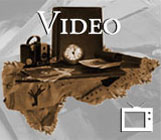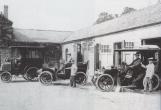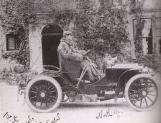14
The Daily MailThe Daily Mail was really the basis upon which the Harmsworth Empire was built. The contents were more appealing to the reading public and consisted of short segments often accompanied by an illustration of some type. It carried a banner headline at the top of the page. Sports and human interest stories were important components, and the Daily News was the first newspaper with a woman's section covering such matters as fashions and cookery.
16
Daily Mirror CartoonEarly 1900s
England
 Credits:
Credits:Ferris, Paul. The House of Northcliffe: The Harmsworths of Fleet Street. Weidenfeld and Nicolson, London, 1971.
17
Alfred Charles William HarmsworthEarly 1900s
Location unknown
 Credits:
Credits:Grand Falls Windsor Heritage Society A.N.D Collection
18
Lord Northcliffe Dictates an Article for the Times1917
London, England
 Credits:
Credits:The Project Gutenberg EBook of Punch, or the London Charivari, Vol. 152, June 27, 1917, by Various
19
BBC Four "Scandal, Hypocrisy and Birth of the Tabloid Press." Part 1 of 42008-2011
Worldwide
 Credits:
Credits:BBC FOUR
http://www.youtube.com/watch?v=2GgP57gFMhI
20
BBC Four "Scandal, Hypocrisy and Birth of the Tabloid Press." Part 2 of 42008-2011
Worldwide
 Credits:
Credits:BBC Four
http://www.youtube.com/watch?v=rMAuFFg9f_U&feature=related
21
BBC Four "Scandal, Hypocrisy and Birth of the Tabloid Press." Part 3 of 42008-2011
Worldwide
 Credits:
Credits:BBC Four
http://www.youtube.com/watch?v=34hatGMNkdM&feature=related
22
BBC Four "Scandal, Hypocrisy and Birth of the Tabloid Press." Part 4 of 42008-2011
Worldwide
 Credits:
Credits:BBC Four
http://www.youtube.com/watch?v=u0Z35IFVCXU&feature=youtube_gdata
23
One Newspaper to Rule Them All1896
London, England
 Credits:
Credits:http://blogs.smithsonianmag.com/
Elliott & Fry
24
Early Interest in Technology/GadgetsFrom his early days working with and writing about cycles. Alfred retained his interest in and support for all things technological and inventive. He was always searching for ways to improve his newspaper production and this meant being on the leading edge of scientific progress. He used his newspapers to promote inventions such as the telephone, electric light, photography, motorcycles, motor cars and aircraft. He was so passionate about cars that he prohibited the editor of the Daily Mail from reporting details of automobile accidents. He was an avid motorist and promoted regulating travel on British roads.
He was curious about flight and foresaw its importance to the future of the world, particularly in matters of security and communication. In 1906, to promote the expansion of and support for aviation, Harmsworth offered a prize of £1,000 for the first airman to cross the English Channel from Calais to Dover and £10,000 prize for the first completed flight from London to Manchester, By June 1910, both of Harmsworth's prizes had been won by French pilots.
After the success of the Wright Brothers in the U.S and France and Count Zeppelin in Germany, Lord Northcliffe became more-than-ever convinced of the importance of air power. He "…believed the British Government should at once purchase a Wright airplane and so learn all its technical secrets….His genius enabled him to see that Britain's strategic position would be affected more radically than that of any other country when aircraft was more fully developed." (Gollin, p.4) He proceeded to finance a number of aviation contests such as crossing the English Channel and later the Atlantic Ocean. The latter contest was won by Alcock and Brown in 1919 on a flight which originated in Newfoundland and ended in Ireland.
After the war Northcliffe retained his interest in new technology. As an example, he began a campaign to promote wireless communication by arranging for the Daily Mail to sponsor the world's first wireless concert.
25
Alfred Harmsworth: Early Interest in Technology/Gadgets1903
 Credits:
Credits:Thompson, J. Lee. Northcliffe: Press Baron in Politics 1865-1922. Publisher: John Murray; 1st Edition (2000)
26
Norcliffe and first Mercedes in EnglandEarly 1900s
England
 Credits:
Credits:Taylor, S.J. The Great Outsiders; Northcliffe, Rothermere and The Daily Mail. Copyright © S.J. Taylor, 1996
27
Power and Political LifeIn 1895, Alfred Harmsworth decided to stand as the Conservative candidate for Portsmouth in the General Election of that year. However, there was a great upsurge of support for the Liberals and, despite a tremendous effort, he failed to win the seat. Thereafter, he gave up any personal aspirations he had and concentrated on wielding power through his newspapers and private manipulation behind the scenes.
On June 23rd, 1904, Alfred Harmsworth became the youngest peer in the history of the realm when he became Lord Northcliffe. He used his papers as early as 1900 to warn the British public of an impending war with Germany. When the war finally erupted in 1914, Northcliffe used some unorthodox methods of spreading his news by delivering 10,000 copies per day free of charge to the frontlines in France and by using frontline troops as sources of information. He also fiercely criticized Lord Kitchener, Secretary of State for War, because of the many problems attached to the munitions Kitchener had approved for use in the conflict stating that they were outdated weapons similar to those used in the Boer War and totally unsuitable for trench warfare. Harmsworth succeeded in having the munitions strategy changed. He also attacked Asquith, the Prime Minister, in his papers and succeeded in having him resign in 1916. The new government under David Lloyd George offered Northcliffe a cabinet position but he refused it largely because it would interfere with his ability to criticize the government in his papers. He visited the United States in 1917 as an ambassador of the British government in an effort to persuade them to enter the war on Britain's side. In addition, he accepted a position as Director of Propaganda in 1918 and in this portfolio, he was responsible for the dropping of some four million leaflets on enemy territory, a feat which created wide-spread demoralization.
